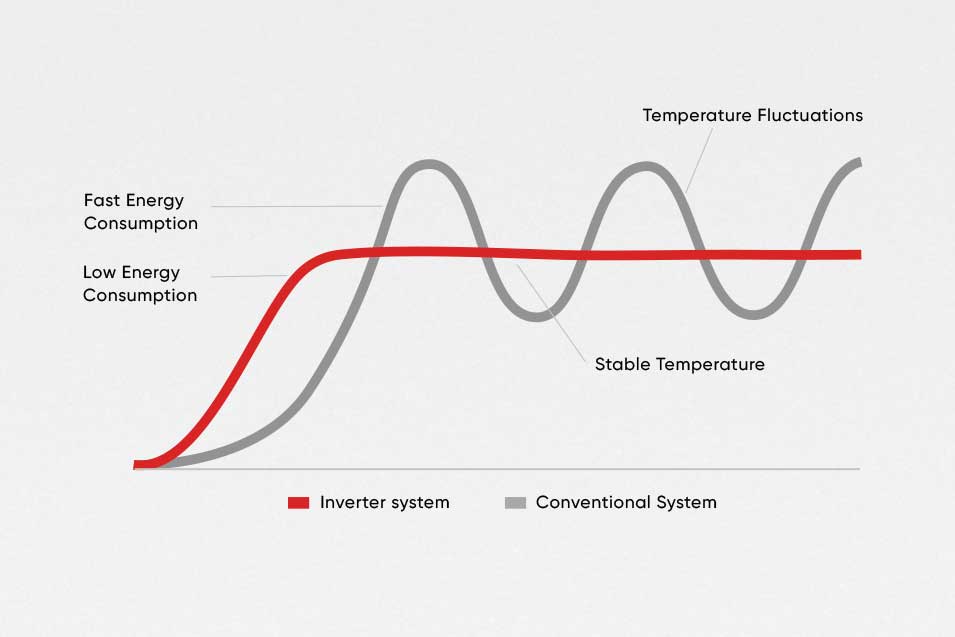
What is inverter technology and how does it save electricity?
Inverter technology has revolutionized the way we use electrical appliances in our homes and offices. This technology was developed by the Japanese electronics company Toshiba, in the early 1980s. From air conditioners to refrigerators, this technology has become the most opted technology as it offers significant energy savings, improved performance, and an environmentally friendly approach to everyday tasks. Traditional electrical appliances perform work by turning the compressor on and off repeatedly to maintain the desired temperature. However, this method is inefficient and consumes a lot of electricity. In contrast, inverter technology works by controlling the speed of the compressor motor, which in turn adjusts the cooling or heating output of the appliance. This allows the compressor to run at a variable speed, and more precise temperature, which significantly reduces energy consumption.
In this blog, we will explore what this technology entails and delve into the benefits it provides.
What is inverter technology?
Inverter technology is a technology that significantly reduces energy consumption and increases the efficiency of the device. This technology primarily focuses on optimizing the compressor’s operation in air conditioners or refrigerators, which is the most power-consuming component in these appliances.
Benefits of inverter technology
- Energy efficiency:- Inverter technology in heating and cooling electronic appliances significantly reduces energy consumption by adjusting the compressor’s speed. It also eliminates the frequent on-off cycles that help in saving energy. Designed to be more energy-efficient and provide better performance compared to their non-inverter counterparts, these appliances can lead to long-term cost savings on energy bills due to reduced power consumption.
- Temperature control:- Inverter-based appliances are very stable and maintain precise temperatures. Since the compressor adjusts its speed to match the needs, it prevents temperature fluctuations and helps in providing a comfortable and controlled environment.
- Quieter operation:- As the compressor runs at lower speeds, the inverter-based compressors are less noisy compared to conventional compressors that operate at maximum capacity.
- Longer lifespan:- The smooth start-up of the inverter compressor puts less strain on the components, leading to increased durability and a longer lifespan for the appliance.
The popularity of inverter air conditioners and refrigerators just goes to prove that energy efficiency has become a pressing concern for individuals and businesses alike. The inverter technology plays a crucial role in conserving electricity and promoting sustainability. However, when shopping for inverter appliances, look for appliances with a higher star rating, as this will ensure maximum energy savings. It is also important to choose an appliance that is the right size for your needs, as an oversized appliance will consume more energy than necessary.
Frequently Asked Questions (FAQs) :
Q1. Are appliances with inverter technology more expensive?
Appliances with inverter technology are more expensive than their non-inverter counterparts. As inverter technology involves more electronic components, which increases manufacturing costs. However, though the initial purchase cost is higher, appliances with inverter technology consume less power which helps in cutting down the electricity bill to a great extent.
Q2. Can I fit inverter technology into existing appliances?
No, it is not possible to fit inverter technology into existing appliances. Inverter technology is a special feature that needs to be embedded into the appliances during the manufacturing process.
Q3. Do inverter appliances require special maintenance?
No, inverter appliances do not require any special maintenance beyond what is needed for regular appliances. However, it is suggested that while using these appliances you must follow the manufacturer’s guidelines, regularly maintain them, and get them serviced at timely intervals.
Q4. Which appliances use inverter technology?
Inverter technology is used in many appliances to provide more efficient and precise operation. Some of the appliances that use inverter technology are air conditioners, refrigerators, washing machines, and fans with BLDC technology.
Q5. Does inverter technology consume less electricity?
Yes, inverter technology is created to consume less electricity compared to non-inverter appliances. Appliances with inverter technology use variable-speed motors or compressors that adjust their power consumption as per the load or demand. They are continuously regulating the speed or output to match desired output, which results in more efficient operation and reduced energy consumption.
Q6. What is the difference between inverter vs non-inverter appliances?
There is a lot of difference between the way inverter and non-inverter appliances function. Non-inverter appliances use fixed-speed motors or compressors that run at a constant speed while inverter appliances use variable-speed motors or compressors to adjust their speed and power needs as per the load or demand. Hence, inverter appliances are more energy efficient compared to non-inverter appliances.

